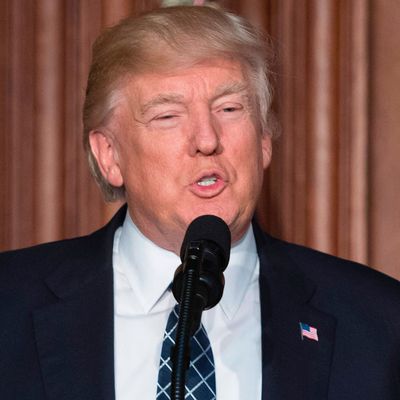
After months of deliberation, President Trump has decided to undermine international cooperation on the greatest threat facing humanity — along with America’s diplomatic relationship with virtually every other country on planet Earth — so as to flatter the prejudices of reactionary oil barons and “rolling coal” enthusiasts.
Administration officials told Axios, CNN, ABC News, and the New York Times Wednesday that Trump is preparing to withdraw from the Paris climate accord. However, those who spoke with the Times “cautioned that the decision is not yet final.”
Axios reports that the energy industry’s favorite EPA chief is working with a small team on how precisely to go about extricating the U.S. from the agreement. They have at least three options to consider:
(1) Announce that the U.S. wants out, thereby triggering a years-long withdrawal process (and snowflake libs). Under the terms of the agreement, no nation can send official notice of its intent to exit until three years after the deal came into force, which happened four days before Trump won the White House. Once that notice is sent, the actual withdrawal process takes a year. Which is to say: If Trump goes this route, the U.S. will officially withdraw from the Paris deal just days before voters head to the polls for the 2020 election.
(2) Declare the Paris deal a legal treaty, toss it to the Senate, and let Mitch McConnell put the agreement (and, perhaps, human civilization) out of its misery. This may leave the U.S. as a signatory in the eyes of the world community, but would give Trump broader institutional support for nullifying the agreement. As Axios notes, Trump could pair a Senate vote with option No. 1 or with option No. 3:
(3) Torpedo the genuine legal treaty that underpins the Paris agreement — the United Nations Framework Convention on Climate Change (which was ratified in 1992, before the GOP decided climate science was a socialist conspiracy). The benefit here is that Trump could leave the broader treaty — and, thereby, void America’s participation in the Paris deal — in a single year. The drawback is that this would sideline the U.S. from all global climate diplomacy.
Notably, regardless of Trump’s decision on Paris, his administration was always going to spend the next four years sabotaging the spirit of the agreement. The EPA is already led by a man who’s to the right of parts of the coal industry on climate issues. The president has already rolled back myriad Obama-era climate regulations. And even the administration’s “globalists,” who argued for staying in the agreement, often did so on the grounds that the U.S. could more effectively protect U.S. fossil-fuel interests with a seat at the table — ostensibly, by using the threat of withdrawal as leverage for crippling efforts to adopt more stringent emissions standards.
Since the Paris accord isn’t actually a legally binding treaty, remaining in it would not have constrained Trump’s capacity to accelerate the pace of climate change on the home front.
But pulling out of the agreement may prove an effective way for the United States to constrain the capacity of the global community to accelerate the transition to cleaner forms of energy. As the Times reports:
The exit of the United States, the world’s largest economy and second-largest greenhouse gas polluter will not dissolve the 195-nation pact, which was legally ratified last year, but it could set off a cascade of events that would have profound effects on the planet. Other countries that reluctantly joined the agreement could now withdraw or soften their commitments to cutting planet-warming pollution.
“The actions of the United States are bound to have a ripple effect in other emerging economies that are just getting serious about climate change, such as India, the Philippines, Malaysia and Indonesia,” said Michael Oppenheimer, a professor of geosciences and international affairs at Princeton, and a member of the Intergovernmental Panel on Climate Change, a United Nations group that produces scientific reports designed to inform global policy makers.
Once the fallout settles, he added, “it is now far more likely that we will breach the danger limit of 3.6 degrees,” the average atmospheric temperature increase above which a future of extreme conditions is irrevocable.
The impact on America’s credibility in international diplomacy could also prove significant.
Last week, 22 Republican senators, including Majority Leader Mitch McConnell, implored Trump to leave the agreement in a written letter. In Axios’s account, the missive strengthened Trump’s resolve to exit.
This is a detail worth dwelling on: For all that makes Trump a singularly destructive figure, the single most destructive action of his presidency may prove to be one that was dictated by the GOP’s congressional leadership.






























